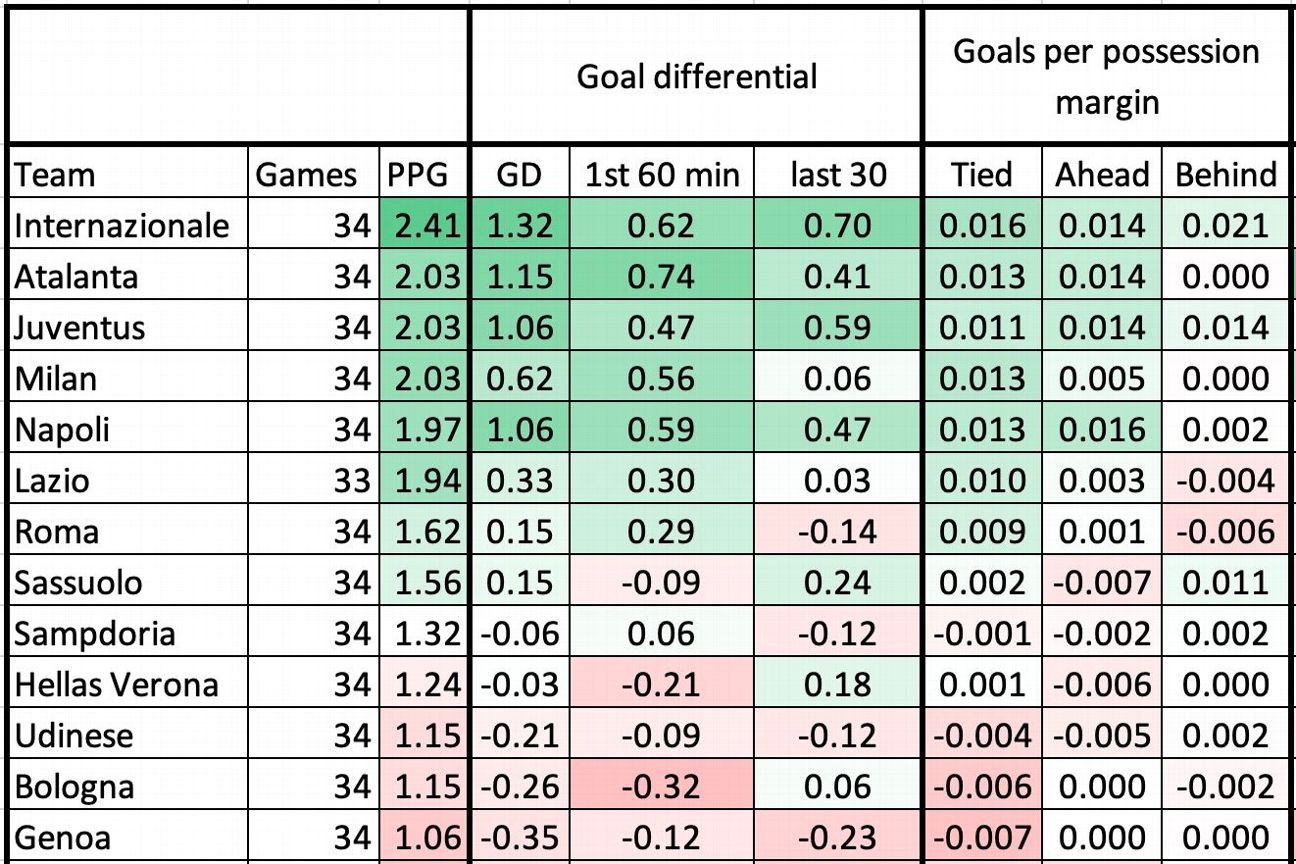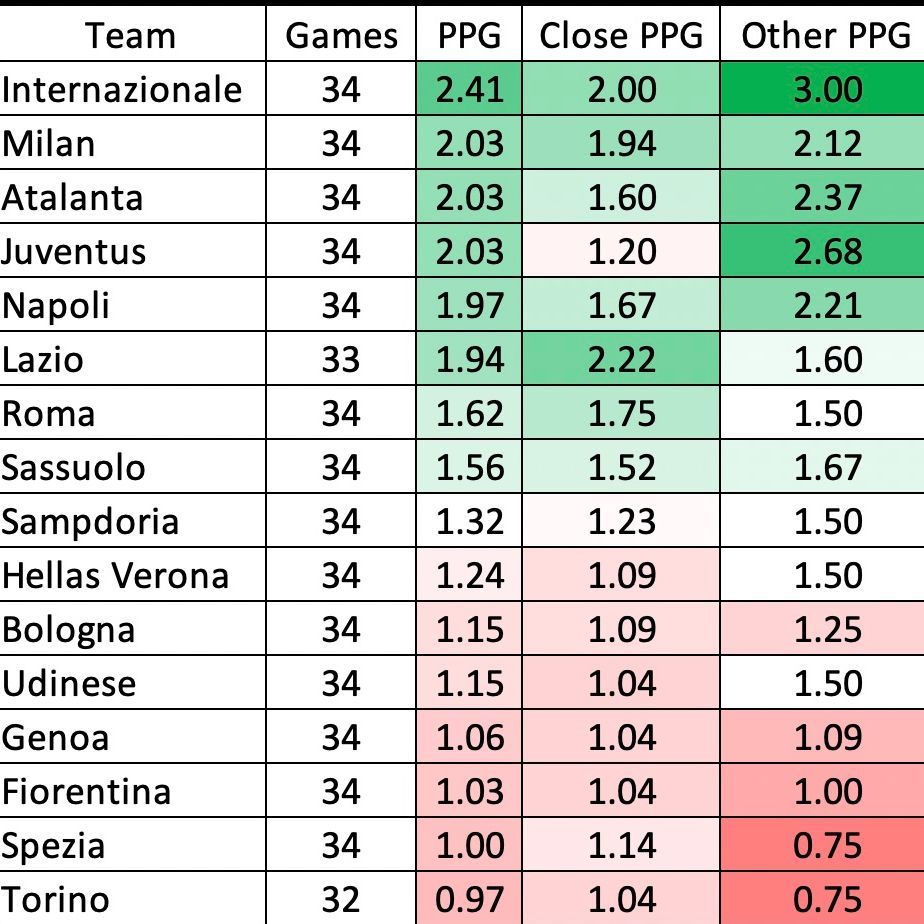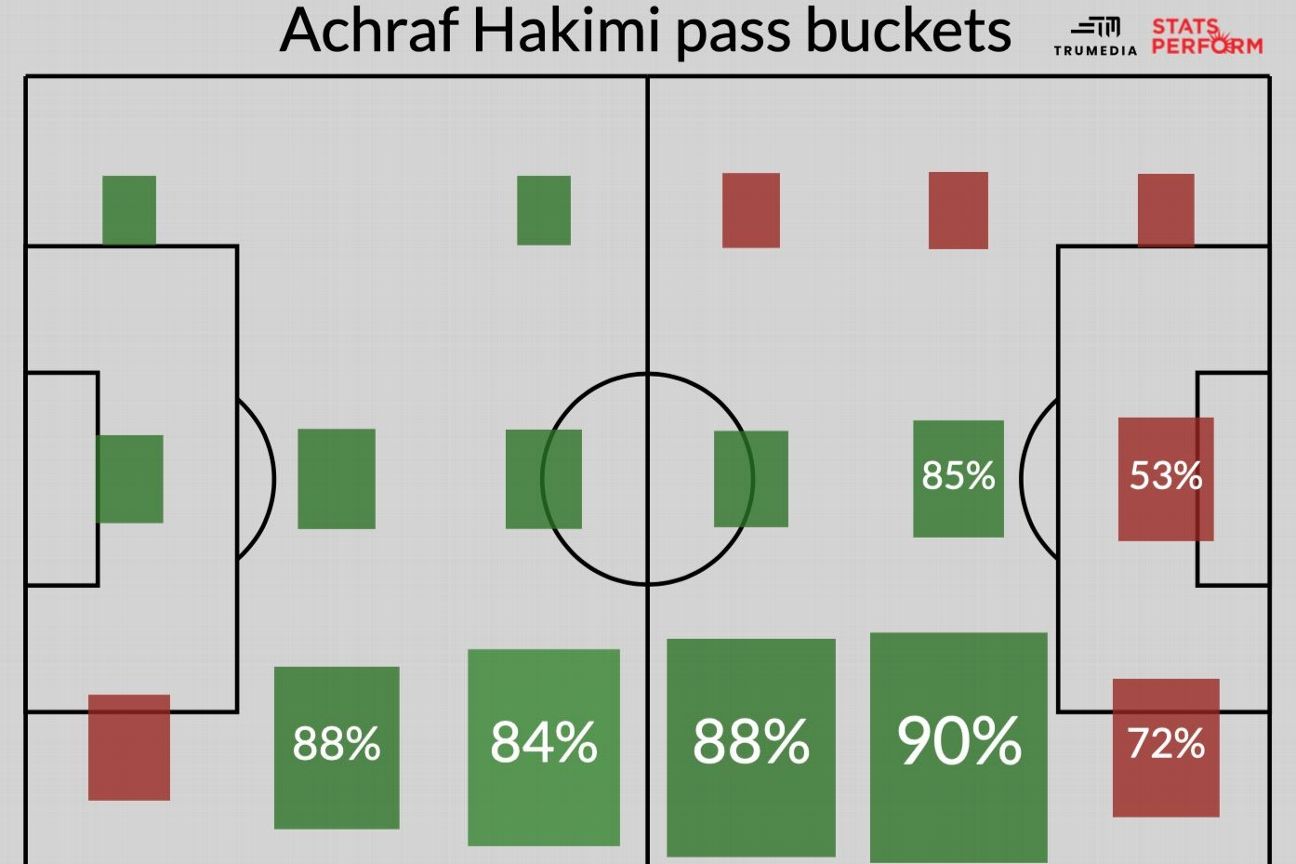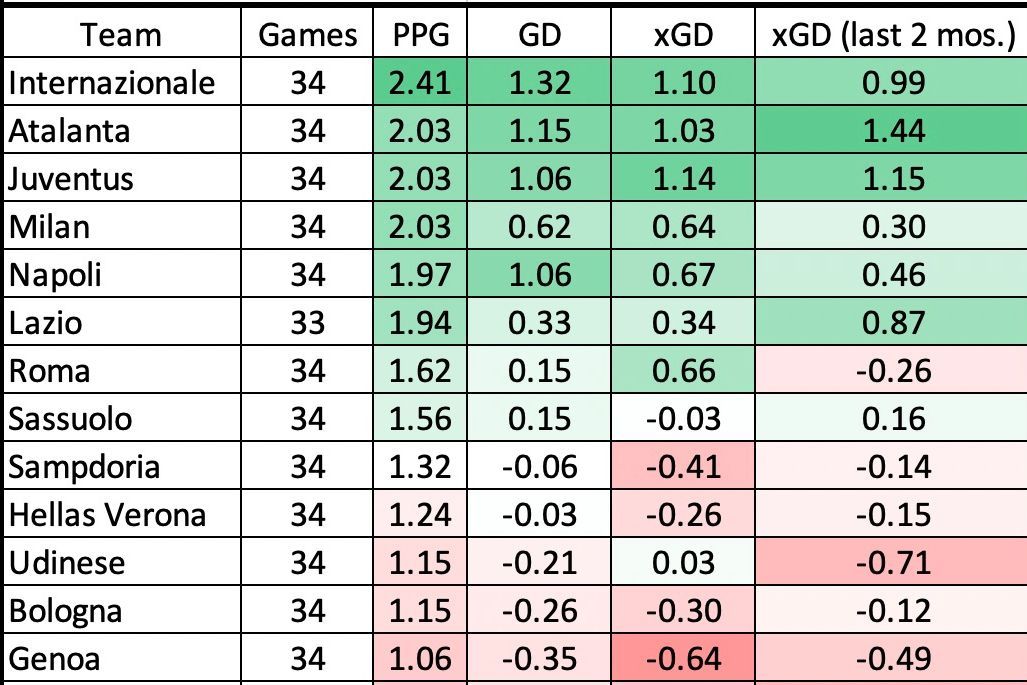A businesslike 2-0 win over Crotone on Saturday, followed by a draw for 10-man Atalanta against 10-man Sassuolo on Sunday, gave Inter Milan the points it needed to claim the Serie A title this past weekend. It was the storied Nerazzurri's first Scudetto in 11 years and the first for any club not named Juventus in 10.
The statement on Inter's website -- "We are, yes, we are. Champions of Italy. We can finally scream it, after dreaming of it, after keeping it hidden in the depths of our hearts, after holding on to it like a precious dream that we did not want to waste" -- was sufficiently romantic and cathartic. While the aftermath of both the coronavirus and the failed Super League coup attempt (of which Inter was a part) clouds virtually everything about the near future, it's worth taking a moment to look back both on how Juve's title streak ended, and why Inter became the team to end it.
The most relentless team wins the race
The 2019-20 race was stiff enough to suggest change was coming. Juve won its ninth straight title last season by the skin of its teeth, registering its lowest point total since 2010-11 and holding off Inter by just one point and both Atalanta and Lazio by five. Inter held onto attackers Romelu Lukaku and Lautaro Martinez and added midfielders Achraf Hakimi and Nicolo Barella, AC Milan retained the heart of a team that had looked great down the stretch, Atalanta was still very much Atalanta, and Napoli returned the bulk of a team that appeared statistically unlucky the previous season. There was every reason to hope this would be the best Serie A race in years.
It would have been, too, had Inter not pulled away from the field. With four matchdays remaining, Atalanta, Juventus, Milan and Napoli are all within two points of each other in second through fifth place, and Lazio remains only five points back of a top-four spot with a game in hand.
Inter, however, has lost only twice all year in league play (2-1 defeats to AC Milan on Oct. 17 and Sampdoria on Jan. 6) and if anything, their surprising Champions League failure -- two losses to Real Madrid and two scoreless draws against Shakhtar Donetsk relegated them to last place in Group B, eliminating them from the Europa League as well -- allowed them to focus on grinding away in the league.
Inter's biggest strength this year: finishing. I mean that in two different ways.
First, finishing shots. Inter are second in the league in goals per match, first in expected goals (xG) per shot and second in xG for shots on target per shots on target (xGOT/SOT). Translation: they take great shots and place them in dangerous areas of the goal mouth.
Second, finishing matches. If we tease out goal differential in a couple of different ways -- GD in the first 60 minutes and last 30, and GD per possession when tied, ahead and behind -- we see that Inter didn't really differentiate itself over the first hour or when a game was tied. But they were the best team in the league late in a match, and they were the most capable of tying a match when behind.

Inter has trailed in 10 matches and still generated 16 points from them: 1.6 per match. They've also got a +12 goal differential over the last 15 minutes of the match. Both figures are best in the league. They've also scored 17 goals after the 75th minute, one in every other match on average.
Granted, this isn't the most sustainable skill in the world. Your stats in the more basic and common game states -- first 60 minutes, how you play when the match is tied, etc. -- correlate more to how you'll perform from year to year, and Inter didn't stand out quite as much in those areas. But timely play wins Scudettos.
Lady Luck finally frowned on Juve
In close matches (those decided by zero or one goal) Inter has averaged two points per match: 11 wins, seven draws and two losses. That's on the high end of the sustainability scale -- in Europe's "big five" leagues, only Lazio (an extremely unsustainable 2.22) and Manchester City (2.07) have a better average -- and one can see how Inter's strong late-game play may have made a difference here.
What made perhaps the biggest difference in this race, however, may have been Juventus' sudden inability to close out matches. Over their nine-year title run, Juve averaged under 1.83 points per close match just once (1.7 in the first year of the streak). While their level of dominance had slid in recent years, their ability to close games remained high -- they averaged 2.29 points per close match in 2018-19, and 2.14 in 2019-20.
They're averaging 1.2 points per close match this season: three wins, three losses, nine draws. The average was even worse before Sunday's late 2-1 comeback over Udinese, too. In fact, with last year's close-game average, Juve would have earned 13 more points... in a race they're currently trailing by 13.

The Bianconeri won't draw much sympathy from the rest of the league, but you can make the case that they've been the unluckiest team in Serie A on the pitch. Their xG differential (+1.14 per match) is actually higher than Inter's (+1.10), but some combination of quality finishing and good fortune pushed a new team to the top of the league.
It probably isn't a total coincidence, though, that Juve created fewer breaks and suffered a few more glitches as its roster -- the midfield, in particular -- got much younger. Granted, they are still led in minutes by right-back Danilo (29 years old), forward Cristiano Ronaldo (36) and goalkeeper Wojciech Szczesny (31), with full-back Juan Cuadrado (32) and centre-back Leonardo Bonucci (34) also playing key roles. But star centre-back Matthijs de Ligt is still only 21, and midfielders Rodrigo Betancur (23), Federico Chiesa (23), Dejan Kulusevski (21) and Weston McKennie (22) are each over 1,500 league minutes for the season.
All have alternated between flashing brilliance and showing their age. And while Ronaldo remains one of the best goal scorers in the world, he is not a heavy pressure guy; with him up top, new manager Andrea Pirlo hasn't been able to fully implement the pressing-and-possession style he was hired to deploy.
Still, from the perspective of sustainability and base stats, Juve is better than its record this season and might be better than it was last year. That they weren't a stronger contender was probably a bit of a fluke.
Romelu Lukaku among the greats
"This could be the team I need." That's what the Belgian striker said when he arrived in Milan at the start of the 2019-20 season. He was only 26 years old at the time, but had already enjoyed a lengthy career -- he had scored nearly 40 goals for Anderlecht before his 18th birthday, and after a failed stint at Chelsea, he had scored 17 goals in one season for West Bromwich Albion, 87 in all comps in four seasons at Everton and 42 in two at Manchester United. Yet after a disappointing 2018-19 campaign in Manchester, he appeared worn-out and in need of a fresh start.
He got just that in Italy. In 69 league matches for Inter, Lukaku has scored 44 goals, with 12 assists and 103 chances created. He remains one of the most well-rounded forwards in the game, capable of working into high-quality shooting positions (removing penalties, he averaged 0.22 xG per shot this season), but also passing and attacking well in space. He's formed a perfect partnership with the smaller and quicker Martinez, who has contributed 29 league goals and eight assists since Lukaku's arrival.
Over the past two seasons, only five players in Europe's big-five leagues can match or top both Lukaku's 33 non-penalty goals and 12 assists: Barcelona's Lionel Messi, Paris Saint-Germain's Kylian Mbappe, Tottenham Hotspur's Harry Kane, Real Madrid's Karim Benzema and Lazio's Ciro Immobile. That's good company. Lukaku remains one of the best strikers in the world, and he is only about to turn 28 -- he's got at least a couple of prime-age seasons left.
That makes one other quote from his Milan arrival pretty interesting: "It was the perfect moment for me to leave England. I didn't want to be there anymore." We might find out just how badly he doesn't want to be there, as recent transfer rumors suggest that there's plenty of interest in a team bringing him back.
The most underrated signing of last summer
Inter hasn't exactly batted 1.000 with its biggest transfers in recent seasons; Radja Nainggolan (brought from Roma for €38 million in 2018), Valentino Lazaro (€22 million from Hertha Berlin in 2019) and Matteo Politano (€20 million from Sassuolo in 2019) have spent almost all of their respective tenures on loan, while Christian Eriksen hasn't provided the €20 million in value -- plus a hefty salary -- that Inter paid Tottenham for in January 2020. But they scored big with the additions of Martinez in 2018 and Lukaku in 2019, and Hakimi has already proven worth last summer's €40 million price tag.
The most unique aspect of manager Antonio Conte's approach is his insistent use of a three-man defensive line. The 3-5-2 structure asks a ton of its wing-backs/wide midfielders: they must stretch defenses and provide assistance in attack while quickly tracking back to prevent counterattacks when the ball is lost. Though veterans Ivan Perisic and Ashley Young have done a decent job on the left side, Hakimi has been a revelation on the right, recording seven goals, six assists and 111 recoveries by himself in 2,404 league minutes.

(Editor's Note: The "attacking" direction is left to right.)
Hakimi is one of the best in Europe in progressing the ball toward the attacking third, and with six of his seven goals coming in transition situations, he has given Inter a dangerous vertical element to go along with Conte's more patient principles of possession. The former Real Madrid prospect never got a chance to shine at the Estadio Santiago Bernabeu, but after two years of making a difference on loan for Borussia Dortmund -- it's probably not a coincidence that BVB has regressed a bit in his absence -- he helped convert Inter from contender to champ.
A roster built for the long haul ... if Inter can afford it
Lingering COVID concerns aside, it was discomfiting watching the celebrations unfold in Milan while knowing of the financial storm clouds on the horizon. Inter is said to be upwards of €500 million in debt, due to both the coronavirus and ambitious spending. Its majority owner, the Chinese retailer Suning, has been dealing with the effects of a state-sponsored bailout back home and has been actively seeking new club investors of the equity-firm variety. Along with the promise of long-term riches, the need for a boost in short-term cash played a major role in Inter's participation in the failed Super League venture.
🇮🇹 | I M MILANO
— Inter 🏆🇮🇹 (@Inter_en) May 2, 2021
Keeping the Black & Blue flag flying high ⚫️🔵🏆#IMInter #IMScudetto #ForzaInter pic.twitter.com/Sp0CvhMHa9
Like plenty of other clubs in Italy and throughout Europe's Big Five leagues, Inter faces major financial uncertainty moving forward. The sale of players like Lukaku, Martinez or Hakimi wouldn't be particularly surprising, but it would be unfortunate -- their roster base has both massive upside and, considering the ages of key players, room for further growth.
Not including goalkeepers, Inter got 63% of its league minutes from players between the ages of 22-28. Even with its in-process youth movement, Juve still got 33% of its non-GK minutes from players 30 and older; Atalanta was at 42% 30 and older. Adjusting for the percentage of minutes played, Inter's average roster age of 27.2 is higher than only Milan's (24.9) among Serie A's top six teams.
Lukaku, centre-back Milan Skriniar and central midfielders Barella and Marcelo Brozovic will all be within the generally accepted peak-age range of 25-29 next season, and Martinez and Hakimi still have some time before they peak. If it were held together, this could be the base of some tremendous teams in the coming years. But it's hard to be particularly optimistic about it holding together.
With no roster changes whatsoever, we would be looking at a potentially fun Serie A race next season. Inter, Juve and Atalanta are all particularly close from the perspective of xG differential, Napoli and Roma have been Champions League-worthy when key pieces were healthy -- admittedly a bit of a rarity -- and AC Milan has a high-upside but extremely young core, which is at least part of the reason for its current slide. (They have averaged just 1.7 points per match over the last two months, far closer to Sampdoria and Cagliari than anyone else in the current top six.) Lazio is harder to figure out: the Biancocelesti have been unsustainably successful in close matches but have also been undeniably awesome in recent weeks.

In a static environment, I would likely consider Inter and Juve co-favorites at the start. But until we find out who is fiscally healthy enough to add further pieces and who can't avoid a sell-off, it's hard to be too confident about how any of these teams will look when the next season begins in just over three months. But we know for sure who was most worthy of the top spot in 2020-21.
